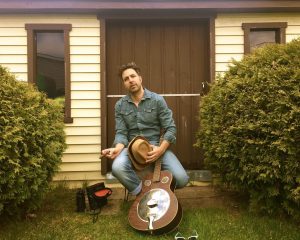 We discovered him as a member of The Dears, during the golden era of early-2000s indie rock, when bands like Arcade Fire and Stars took off. Times and trends have changed, and the proverbial “Montréal sound” is now more about Frenglish rap, but Krief is still at it. He’s remained focused on what he does best: sad, yet biting songs.
We discovered him as a member of The Dears, during the golden era of early-2000s indie rock, when bands like Arcade Fire and Stars took off. Times and trends have changed, and the proverbial “Montréal sound” is now more about Frenglish rap, but Krief is still at it. He’s remained focused on what he does best: sad, yet biting songs.
Krief is among those who reigned like kings over what was, back then, a much less gentrified Mile-End, the Mecca of young, skinny jeans-clad musicians. The Dears’s breakthrough came with their 2003 album No Cities Left, and they were the talk of the town around the turn of the millennium. Not just on the local scene, but in the U.S. and Europe as well.
“There was a big scene in Montréal, but it was like nothing was happening here,” he says. “All these bands from Montréal were doing great outside of the city, but when we’d get home, it was totally quiet, there were few shows, but we did hang out together quite a bit. From 2004 to 2010, I was never home, out in bars and clubs with the other bands like The Stills, Sam Roberts, Stars. I have no idea what the scene is like now. I rarely get out of my home! Even before the pandemic I was a total homebody.”
Voluntarily under house arrest, Patrick (his first name) now composes on his own, and he’s looking to write something timeless. Something classic. Echoes of Abbey Road and the The White Album can be heard, subtly but undeniably, all over his album Chemical Trance, released in mid-August. The Beatles had a clear influence on the musician he’s become.
“My role model for drums is in part Mitch Mitchell, who played for Jimi Hendrix, but mostly Ringo,” says Krief. “I love the way he plays on “I Want You (She’s So Heavy),” for example. “Even the way I tune my drums and mic them is very old-school. I like modern music, I listen to pop and all that, but I never look for what’s trending or hot. I’m not that interested. If I did that, I’d run a bigger risk of being un-trendy.”
Known as a guitarist first, his main instrument is an extension of his body and a catalyst for his emotions. His guitar solos, always improvised in the studio, speak much louder than words, in his case. It’s like he’s given himself the licence to howl, but without opening his mouth. “I could play a gazillion notes an hour, but that’s not me, and I want the guitar to sing a song, tell a story or express an emotion,” he says. “It’s very easy for me to express anger through my guitar, much easier than with my voice. Take “Man About Lies,” there’s so much rage in there that it makes no sense musically, it’s really weird. It’s like police sirens, a fight, or something like that.”
Turns out Krief is quite the one-man band. As an accomplished multi-instrumentalist, he played virtually every sound heard on the album, which is rife with outbursts, sadness, genuinely psychedelic atmospheres, and dramatic changes of direction that are, as he readily admits, inspired by the immense legacy of Beethoven. This collection of complex and progressive songs are as many-faceted as the man. “I really enjoy playing all the instruments, because it allows me to be different people,” says Krief. “I become a character. I’m a different guy when I play drums. I need to do this to allow my various personalities to come out.”
Cinematic and intense, Chemical Trance is a trip. Videos for each of its songs are being planned. It should give us something to chew on until live concerts can happen again.